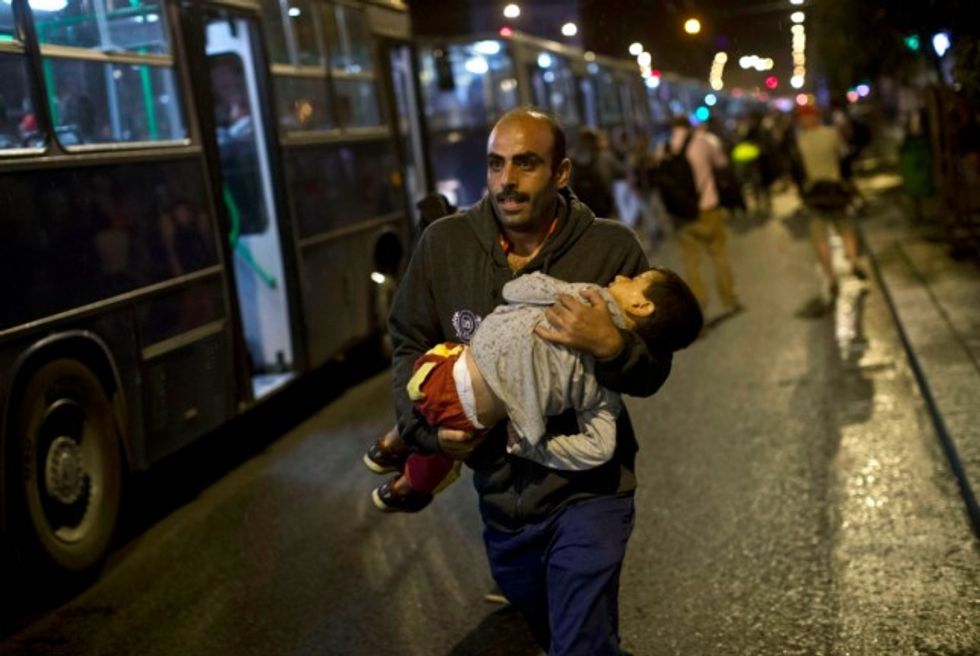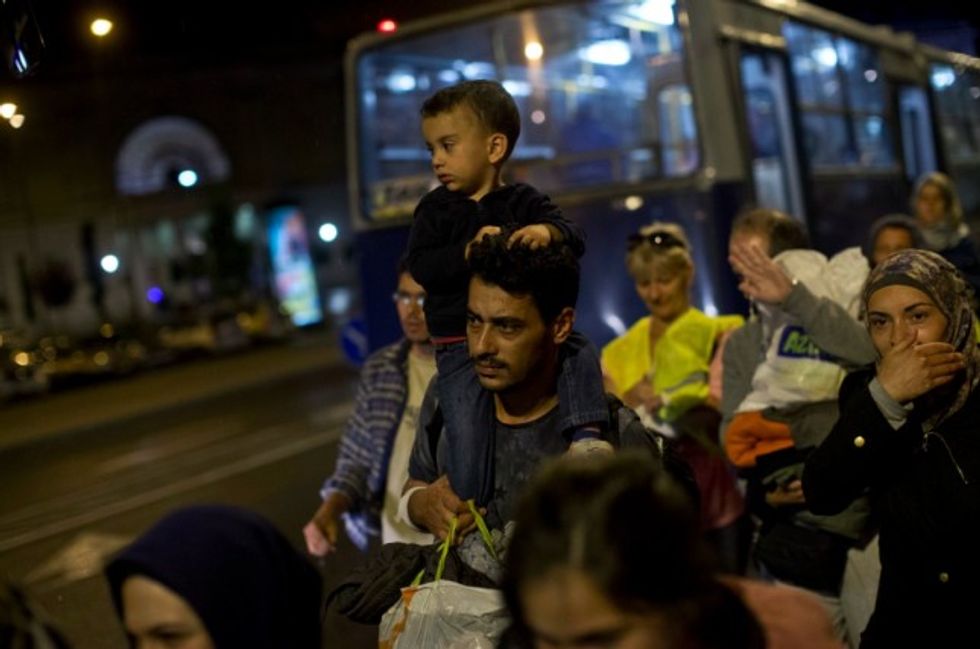
A man runs with child in arms as he tries to board a bus provided by Hungarian authorities for migrants and refugees at Keleti train station in Budapest, Hungary, Saturday, Sept. 5, 2015. (AP Photo/Marko Drobnjakovic)

BICSKE, Hungary (TheBlaze/AP) — Hundreds of migrants, exhausted after breaking away from police and marching for hours toward Western Europe, boarded buses provided by Hungary's government as Austria in the early-morning hours said it and Germany would let them in.

Austrian Chancellor Werner Faymann announced the decision early Saturday after speaking with Angela Merkel, his German counterpart — not long after Hungary's surprise nighttime move to provide buses for the weary travelers from Syria, Iraq and Afghanistan.
With people streaming in long lines along highways from a Budapest train station and near a migrant reception center in this northern town, the buses would be used because "transportation safety can't be put at risk," said Janos Lazar, chief of staff to the prime minister.
Lazar blamed Germany's "contradictory communications" and the European Union for the crisis.
The asylum seekers had already made dangerous treks in scorching heat, crawling under barbed wire on Hungary's southern frontier and facing the hostility of some locals along the way. Their first stop will be Austria, on Hungary's western border, though most hope to eventually reach Germany.
Hungarian authorities had refused to let them board trains to the west, and the migrants balked at going to processing centers, fearing they would be forced to live in Hungary.
Under European law, refugees are supposed to seek asylum in the first European Union country they enter. But many see limited economic opportunities and a less welcoming atmosphere in Hungary than in Germany, Sweden and other Western nations.
In what the Hungarian media called a "day of uprisings," about 350 people broke through a police cordon Friday and began heading to Austria, 85 miles to the west, on tracks leading away from the railway station. Surprised riot police scrambled for their helmets as the crowd surged from the front of the train.
One man, a 51-year-old Pakistani, collapsed about 800 yards from the station and died despite efforts to rescue him.
Those left behind, mostly women and children, were boarded onto buses and taken to the nearby asylum center.
Hours earlier, about 2,000 people set out from Budapest's Keleti station for a 106-mile journey to the Austrian border. At first police tried to block them, but they quickly gave up. By nightfall, the marchers had already covered about 30 miles.
Along the way, some met with gestures of support. Many flashed the V-sight for victory, while some handed out bottles of water to the weary travelers.
A small number made clear the new arrivals were not welcome. "Go home already," one man shouted in Hungarian from a passing car.

Austrian police were making preparations at main border points, with reception areas and first aid facilities. Hans Peter Doskozil, police chief in easternmost Burgeland province, said those measures should be sufficient for the initial arrivals.
Also Friday, the Hungarian parliament tightened its immigration rules, approving the creation of transit zones on the Hungarian border with Serbia where migrants would be kept until their asylum requests were decided within eight days. Migrants would have limited chance to appeal those decisions.
One man leaving Budapest on foot said he expected the journey to Austria to take three days. Osama Morzar, 23, from Aleppo, Syria, was so determined not to be registered in Hungary that he removed his fingerprints with acid, holding up totally smooth finger pads to an Associated Press reporter as proof.
"The government of Hungary is very bad," said Morzar, who studied pharmacology at Aleppo's university. "The United Nations should help."
A couple from Baghdad, Mohammed and Zahara, who marched with a toddler, said they had been in a Hungarian asylum camp and got roughed up by guards because they refused to be fingerprinted. She said she has family in Belgium and is determined to seek asylum there. They would not give their last names.
Saleh Abdurahman, a Palestinian refugee from Syria who marched from Budapest, said he was set on escaping a Middle East made intolerable by wars that he blames on the United States and Europe.
"We don't want to go to their countries because we'd like to be rich," he said. "We only need to be human beings."
In Syria, a man whose family died when a small rubber boat capsized during a desperate voyage from Turkey to Greece buried his wife and two sons in their hometown of Kobani. Photos of the lifeless body of Abdullah Kurdi's 3-year-old son after it washed up on the beach drew the world's attention to the dangers faced by those fleeing war and poverty in the Middle East, Asia and Africa.
"He only wanted to go to Europe for the sake of his children," said Suleiman Kurdi, an uncle of the grieving father. "Now that they're dead, he wants to stay here in Kobani next to them."
Across Europe, the refugee crisis is becoming more dramatic.
In Geneva, the U.N. refugee agency said Friday that nearly 5,600 people crossed from Greece to Macedonia a day earlier. That's roughly double the already high 2,500 to 3,000 per day in recent weeks.
"That is a dramatic number," said UNHCR spokeswoman Melissa Fleming, saying it was the highest she's heard yet.
Earlier Friday, Antonio Guterres, the head of the U.N. refugee agency, issued a statement urging the EU to create a "mass relocation program ... with the mandatory participation of all EU member states" for would-be recipients who clear a screening process.
He said a "very preliminary estimate" would be for the creation of at least 200,000 places to be added across the bloc.
The U.N. comments came a day after a round of recriminations among EU leaders. Hungarian Prime Minister Viktor Orban has said the human wave is a German problem, but Merkel said the obligation to protect refugees "applies not just in Germany, but in every European member."
Orban reiterated on Hungarian state radio Friday his determination to stop the refugees.
"Today we are talking about tens of thousands, but next year we will be talking about millions, and this has no end," Orban said.
"We have to make it clear that we can't allow everyone in, because if we allow everyone in, Europe is finished," Orban went on. "If you are rich and attractive to others, you also have to be strong because if not, they will take away what you have worked for and you will be poor, too."
Mstyslav Chernov in Bicske, Alexander Kuli in Budapest, and George Jahn in Vienna contributed to this report. Gorondi reported from Budapest.
—
Follow Dave Urbanski (@DaveVUrbanski) on Twitter